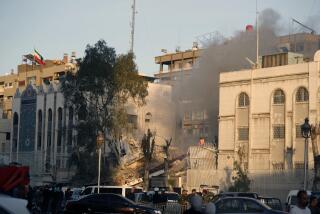U.S. intelligence chief sees limited benefit in an attack on Iran
An Israeli bombing attack might set back Iran’s nuclear development program by one to two years, America’s top intelligence official told a Senate committee Thursday, indicating that viable military options are far more limited than Israeli leaders have suggested.
James R. Clapper, director of National Intelligence, said he does not believe that Israel has decided to attack Iran’s uranium enrichment and other nuclear facilities. Clapper said the U.S. intelligence community believes that Iran’s leaders have not decided to build nuclear weapons but are pursuing technology that might allow them to do so.
Clapper’s appraisal comes as the standoff with Iran has raised concern in Washington and other capitals that Israel may launch a preemptive airstrike, as it did against nuclear targets in Iraq and Syria. Some U.S. officials have suggested that an attack could be carried out this spring.
In recent months, the West has tightened economic sanctions against Iran’s oil and banking sectors, and unidentified assailants have killed half a dozen nuclear scientists in Iran, suggesting a covert campaign to derail the program. This week, Israel accused Tehran of ordering assassination attempts on Israelis living in Thailand, India and Georgia.
Clapper’s comments largely echoed those of Defense Secretary Leon E. Panetta, who recently downplayed the likelihood of an Israeli knockout blow.
“At best,” an Israeli attack “might postpone [Iran] maybe one, possibly two years,” Panetta said in December at the Brookings Institution’s Saban Center for Middle East Policy. “It depends on the ability to truly get the targets that they’re after. Frankly, some of those targets are very difficult to get at.”
Clapper told the Senate Armed Services Committee that U.S. intelligence agencies cannot calculate with precision how much damage, or delay, an Israeli strike might achieve. “There’s a lot of imponderables,” he said, including the targets chosen, how ordnance is used and how quickly Iran might recover.
Most experts argue that Iranian scientists now possess enough technological know-how so that no air campaign, not even sustained bombing by U.S. forces, could destroy Iran’s ability to someday produce a nuclear weapon should it choose to do so.
Last month, Israeli Prime Minister Benjamin Netanyahu made headlines when he told a reporter that Israel can “cause severe damage to Iran’s nuclear sites and bring about a major delay in the Iranian nuclear project.”
U.S. intelligence officials are skeptical. Former CIA Director Michael V. Hayden told a group of foreign policy experts last month that Israel is not capable of inflicting significant damage on Iran’s nuclear sites. Some are situated at the outer range of Israeli bombers, and others are underground, he said.
“The Israelis aren’t going to [attack Iran] … they can’t do it, it’s beyond their capacity,” Hayden said. “They only have the ability to make this worse.”
A monthlong U.S. bombing campaign would inflict far more damage, Hayden said, but it wouldn’t be worth it. The George W. Bush administration studied the issue, he said.
“The consensus was that [attacking Iran] would guarantee that which we are trying to prevent: an Iran that will spare nothing to build a nuclear weapon and that would build it in secret,” Hayden said.
Clapper and Army Lt. Gen. Ronald Burgess, head of the Defense Intelligence Agency, also said at the Senate hearing that the militant group Al Qaeda in Iraq may have played a role in several recent bombings against government facilities in Syria, but they hedged their statements.
Clapper said the bombings at security and intelligence installations in Damascus, the Syrian capital, and Aleppo bear “all the earmarks of an Al Qaeda-like attack. So we believe that Al Qaeda in Iraq is extending its reach into Syria.”
Burgess said U.S. intelligence has seen no evidence that extremists from elsewhere were heading to Syria to fight.
Clapper said that Syria’s stocks of chemical weapons appeared to be secure, and that U.S. intelligence agencies are watching them closely.
More to Read
Start your day right
Sign up for Essential California for news, features and recommendations from the L.A. Times and beyond in your inbox six days a week.
You may occasionally receive promotional content from the Los Angeles Times.







